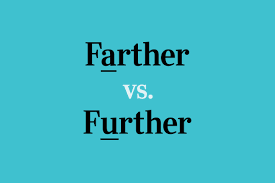Further vs Farther : Mastering The Distance-Based Distinctions
Contents

Why Distinguish between Further and Farther?
Did you know that the word "further" originated from the Old English word "furthra," meaning "more distant" or "extended"? On the other hand, "farther" comes from the Middle English word "feorr," which means "far." This word gradually transformed into "farther" in Middle English but eventually took on the sense of a literal interpretation of distance. These origins shed light on the subtle nuances of their usage.
Well, are you wondering why there is a need to distinguish between the words "further" and "farther" even though they look and sound extremely similar? Then you should know that it's not just about being grammar nerds. There are some practical reasons behind this distinction. The confusion surrounding their usage can lead to misunderstandings and imprecise communication.
In this article, we will delve deeper into understanding the meanings of further and farther, provide guidelines for their proper use, explain pronunciation differences and explore how they are translated into Indian languages.
So let's dive in!
Defining Further and Farther
Understanding the differences between "further" and "farther" is crucial for clear and precise communication. Let's dive into their meanings and usage.
1. Further:
As a comparative adjective, "further" denotes additional distance or time.
It can also be used as an adverb, modifying verbs or adjectives.
Example sentences:
"I need to study further to improve my English skills."
"We need to investigate this matter further."
"Clapingo can take you further in your English journey with its comprehensive learning resources."
2. Farther:
Unlike "further," "farther" is used specifically for physical distance. It indicates a greater physical separation between two points.
Like "further," it can also be used as an adverb or adjective.
Example sentences:
"The supermarket is farther from my house than I thought."
"He threw the ball farther than anyone else."
By understanding these definitions and grasping the examples of "further" and "farther", you'll be able to choose the right word for specific contexts, avoiding confusion and inaccuracies.
Guidelines for the Proper Use of Further and Farther
Here are some guidelines to help you navigate the proper usage of further and farther:
1. Using "Further" for Advancement or Progression:
When you want to express metaphorical advancement or progression, use "further." It denotes additional distance, time, or progress. For example:
She further elaborated on her research findings.
We need to further discuss this matter.
Tips for incorporating "further" in spoken English:
Practice using phrases like "furthermore," "in addition," or "to go even further."
Learn perfect sentence formation in English online to confidently express yourself.
Here are some more common phrases that use "further":
Further information
Further details
Further investigation
2. Using "Farther" for Physical Distance:
When referring to physical distance only, use "farther." It is a comparative adjective that indicates a greater physical distance compared to something else. For example:
The supermarket is farther from my house than the park.
He ran farther than anyone else in the race.
Tips for correctly using "farther" in different contexts:
In travel-related situations, use "farther" when talking about distances between destinations.
When discussing measurements, such as length or depth, choose "farther."
Common phrases that use "farther":
Go no farther
No farther than
It's worth noting that while both words can be used as adjectives and adverbs, "further" is more commonly used than "farther."
Remember these guidelines whenever you find yourself unsure about which word to use. With practice, you'll become more comfortable and confident in your usage of further and farther.
Next up, let's dive into the pronunciation differences between further and farther in the various English accents. Stay tuned!

Further vs Farther: Pronunciation Differences
Understanding the correct pronunciation of words is essential for effective communication. The English language is known for its unique pronunciation rules and variations in different regions. In this section, we will explore the pronunciation differences between "further" and "farther" in US, UK, and Indian English.
In US English, "further" is typically pronounced as [ˈfɜrðər], with a soft "th" sound. On the other hand, "farther" is pronounced as [ˈfɑrðər], where the "a" takes on a more open sound.
In UK English, "further" is pronounced similarly to US English, with [ˈfɜ:ðə]. However, "farther" is pronounced as [ˈfɑːðə], with a longer vowel sound.
In Indian English, particularly in regions influenced by British colonialism, the pronunciations are closer to UK English.
By understanding the subtle differences in pronunciation between further and farther, you can confidently use these words in your conversations, ensuring clarity and precision.
Further and Farther in Indian Languages
Did you know that the distinctions between "further" and "farther" exist not only in English but also in various Indian languages? Let's explore how these words are translated and interpreted in some of the top Indian languages.
Language | Translation of further | Translation of farther |
Hindi | आगे | दूर |
Bengali | আরও | আরও দূরে |
Kannada | ಮುಂದೆ | ದೂರದ |
Punjabi | ਅੱਗੇ | ਹੋਰ ਦੂਰ |
Assamese | আগলৈ | দূৰলৈ |
These translations highlight the cultural nuances embedded in the understanding of distance and advancement in different Indian languages.
Final Thoughts
Now that you have gained a deeper understanding of the distinctions between "further" and "farther", let's recap the key points discussed in this article. Throughout this article, we explored the origins of "further" and "farther" and highlighted the confusion surrounding their usage. We discussed how "further" is used to denote additional distance or time, while "farther" specifically indicates physical distance. Both words can be used as adjectives or adverbs.
To ensure proper usage, we provided guidelines for incorporating "further" and "farther" in spoken English. We shared examples of using 'further' to express metaphorical advancement or progression, as well as common phrases that incorporate 'further'. In terms of 'farther', we shared examples showcasing its usage in relation to physical distance, along with tips for correctly using it in different contexts such as travel or measurement.
We also addressed the pronunciation differences between further and farther in US, UK, and Indian English. In addition, we explored translations of further and farther in Indian languages using a table that highlighted cultural nuances.
To conclude, we encourage you to practice using "further" and "farther" correctly in your daily conversations. Remember, clarity and precision are key when communicating effectively. For further resources on enhancing your English language skills, Clapingo is an excellent platform to explore. Their blog offers valuable insights on improving speaking fluency and mastering conversational English.
In conclusion, by understanding the nuances between further and farther, you are better equipped to express ideas accurately. Keep practising, stay curious, and strive for continuous improvement. Happy learning!
FAQs
1) When should I use 'farther' and 'further'?
The key distinction lies in their meanings. "Further" is used when denoting additional distance or time, either metaphorically or physically. On the other hand, "farther" is specifically used to indicate physical distance only. So, if you want to express advancement or progression in a non-physical sense, use "further." However, if you are referring to an increase in physical distance, choose "farther."
2) What is the difference between further and farther away?
Both words can be used interchangeably when referring to physical distance. However, it's more common to use "farther away" when emphasizing a greater physical distance. For instance, you could say, "The mountains are farther away than they appear."
3) Is it "nothing further" or "nothing farther"?
The correct phrase is "nothing further." This phrase signifies that there is no more information or progress available beyond the current point. It isn't related to physical distance but rather metaphorical advancement.
4) Do you speak 'further' or 'farther'?
When it comes to pronunciation, both words follow a similar pattern in US, UK, and Indian English. The key difference lies in the vowel sound: /ɜː/ for “fur” in further and /ɑː/ for “a” in farther.
Comments
Your comment has been submitted